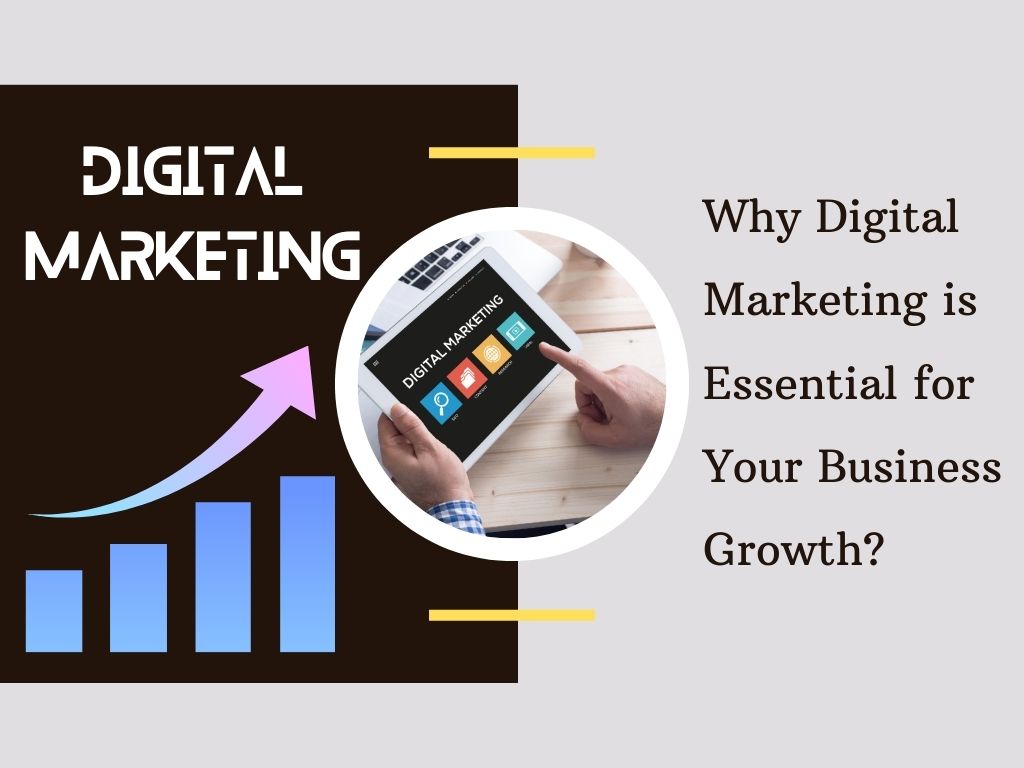Introduction
In today’s rapidly evolving business landscape, Digital Marketing has become the cornerstone of success for businesses of all sizes. Whether you’re a small startup or well-established enterprise, the importance of Digital Marketing cannot be overstated. As consumers increasingly turn to online platforms for their needs, businesses must adapt to this shift to stay relevant and competitive. In this blog post, we will explore why Digital Marketing is essential for your business growth, highlighting key strategies, benefits, and the impact it can have on your bottom line.
Understanding Digital Marketing
Digital Marketing comprises an array of techniques aimed at boosting the visibility and sales of products or services via digital platforms.These channels include social media, search engines, email, websites, and mobile apps. Unlike traditional marketing methods, Digital Marketing allows businesses to reach a global audience with precision targeting, making it a cost-effective and highly efficient way to drive growth.
What are the key components of Digital Marketing?
Search Engine Optimization (SEO):
Optimizing your website to rank higher on search engines like Google and increase organic traffic. By targeting specific keywords, optimizing on-page content, and building high-quality backlinks, SEO helps your website rank higher in search results, leading to increased organic traffic. Well-executed SEO strategy ensures that your business appears when potential customers are actively searching for related products or services, driving consistent and long-term traffic.
Social Media Marketing:
In Digital Marketing, SEO involves optimizing your website to achieve higher rankings on search engines like Google and boost organic traffic. By targeting relevant keywords, refining on-page content, and acquiring high-quality backlinks, SEO enhances your site’s visibility in search results. By executing a strong SEO strategy, your business will appear prominently in search results for related products or services, driving a steady flow of long-term traffic.
Content Marketing:
Crafting valuable, targeted content to capture the attention and interest of your audience. By creating and distributing meaningful, targeted content—such as blog posts, videos, and infographics—content marketing seeks to engage and retain a defined audience. The objective is to provide content that informs, entertains, or motivates, thereby building your brand’s authority in the industry. Effective content marketing not only engages your audience but also drives them toward taking desired actions, such as making a purchase or signing up for a newsletter.
Email Marketing:
Email Marketing: Email marketing involves sending personalized, targeted emails to your subscribers to nurture leads, build relationships, and drive conversions. This approach is particularly powerful because it facilitates direct communication between businesses and their audience. Whether it’s a welcome email, a promotional offer, or a newsletter, email marketing keeps your brand top of mind and encourages repeat business.
Pay-Per-Click (PPC) Advertising:
Pay-Per-Click (PPC) Advertising: PPC advertising is a form of Digital Marketing where businesses pay a fee each time their ad is clicked. This strategy is commonly used on platforms like Google Ads and social media to drive immediate traffic to your website. PPC allows businesses to target specific demographics, locations, and interests, ensuring that ads reach the most relevant audience. It’s an effective way to generate quick results, especially for promotions, product launches, or time-sensitive campaigns.
How Digital Marketing Drives Business Expansion?
Increased Online Visibility
Since billions of individuals are online each day, having a prominent digital presence is fundamental to business achievement. Digital Marketing helps you achieve this by improving your website’s visibility on search engines, maximizing the opportunity to be found by potential buyers. Through SEO, businesses can rank higher on search engine results pages (SERPs), driving organic traffic to their sites.
Targeted Audience Engagement
An important benefit of Digital Marketing is its effectiveness in precisely targeting and reaching particular audience niches. Unlike traditional marketing, where ads are often seen by a broad, unfiltered audience, Digital Marketing allows you to tailor your campaigns to reach the people most likely to be interested in your products or services. This targeted approach leads to higher engagement rates, better conversion rates, and ultimately, more sales.
Cost-Effectiveness
For businesses, especially startups and small enterprises, marketing budgets are often tight. Digital Marketing provides a budget-friendly option compared to traditional media channels such as TV, radio, and print. With strategies like SEO, content marketing, and social media marketing, businesses can achieve significant results without breaking the bank. Though PPC advertising entails costs, it can be very cost-effective when optimized, as you only incur charges when someone clicks on your ad.
Measurable Results
A major advantage of Digital Marketing is its capability to track and measure results in real time. Tools like Google Analytics, social media insights, and email marketing software provide detailed data on how your campaigns are performing. This allows you to make data-driven decisions, adjust strategies as needed, and optimize your marketing efforts for maximum impact. With traditional marketing, measuring ROI is often challenging, but Digital Marketing offers transparency and clarity.
Building Brand Credibility
Maintaining a strong online presence establishes your brand as a reliable expert in your industry. Through content marketing, you can provide valuable information that educates and informs your audience, positioning your brand as a thought leader. Engaging with customers on social media also builds trust and loyalty, as it shows that your brand is accessible and responsive.
Improved Customer Interaction
Digital Marketing allows for direct communication with your audience, enabling businesses to build relationships with their customers. Social media platforms, in particular, are excellent for this, allowing brands to interact with customers in real time, address their concerns, and gather feedback. This form of communication facilitates a deeper understanding of customer needs, allowing businesses to refine their products or services accordingly.
Scalability and Flexibility
Digital Marketing strategies are scalable, allowing businesses to adjust their campaigns according to their budget and goals. Whether you’re launching a new product, expanding into a new market, or simply trying to increase brand awareness, Digital Marketing offers the flexibility to scale your efforts up or down as needed. This adaptability is crucial for maintaining growth in a constantly changing market environment.
Global Reach
A major benefit of Digital Marketing is its capacity to connect with a global audience. Unlike traditional marketing, which is often limited by geographical boundaries, Digital Marketing
allows businesses to connect with potential customers worldwide. This global reach opens up new opportunities for growth and expansion, especially for businesses looking to enter international markets.
Conclusion
In conclusion, Digital Marketing is no longer just an option for businesses; it’s a necessity. In an era where consumers are increasingly turning to the internet to find products, services, and information, having a robust Digital Marketing strategy is essential for business growth. By increasing online visibility, engaging with targeted audiences, and offering measurable results, Digital Marketing provides businesses with the tools they need to thrive in today’s competitive market. Whether you’re a small startup or an established company, embracing Digital Marketing will undoubtedly set you on the path to sustained growth and success.
FAQs
1. What is Digital Marketing and why is it important for business growth?
Digital Marketing refers to the use of online platforms and strategies to promote products or services. It includes tactics like SEO, social media marketing, content marketing, email marketing, and PPC advertising. It’s crucial for business growth because it helps increase online visibility, target specific audiences, and measure campaign effectiveness, all of which drive customer engagement and sales.
2. How does SEO contribute to Digital Marketing?
SEO, or Search Engine Optimization, plays a crucial role in Digital Marketing by improving your website’s ranking on search engines like Google. By optimizing your site’s content, targeting relevant keywords, and acquiring high-quality backlinks, SEO increases your website’s visibility in search results. This enhanced visibility attracts more organic traffic, making it easier for potential customers to discover and engage with your business.
3. What are the benefits of using social media marketing?
Social media marketing leverages platforms like Facebook, Instagram, LinkedIn, and Twitter to engage with your audience and build brand loyalty. It allows for targeted advertising, real-time interaction with customers, and sharing of valuable content. This helps in increasing brand awareness, driving traffic to your website, and fostering customer relationships.
4. In what ways does content marketing support business growth?
Content marketing focuses on producing and sharing valuable content to engage and attract your target audience. By offering informative, entertaining, or motivating material, businesses can establish themselves as leaders in their industry, enhance brand trust, and encourage actions such as purchases or sign-ups. Additionally, effective content marketing boosts SEO and complements other digital marketing strategies.
5. Why is Digital Marketing considered cost-effective?
Digital Marketing is often more cost-effective than traditional marketing methods like TV, radio, and print. With strategies such as SEO, content marketing, and social media, businesses can achieve significant results with lower budgets. Even PPC advertising, which involves costs, can be managed efficiently to ensure you only pay for actual clicks, making it a cost-effective option for immediate traffic.
6. How can Digital Marketing help in measuring campaign success?
Digital Marketing provides tools and analytics that allow you to track and measure campaign performance in real time. Platforms like Google Analytics, social media insights, and email marketing software offer detailed data on metrics such as traffic, engagement, and conversions. This data helps in making informed decisions, optimizing strategies, and demonstrating ROI.
7. What role does Digital Marketing play in building brand credibility?
Digital Marketing helps establish brand credibility by positioning your business as an authority in your industry. Through content marketing, you can share valuable insights and information that educate your audience. Engaging with customers on social media and providing consistent, high-quality content also builds trust and demonstrates your brand’s expertise and reliability.
8. How does Digital Marketing enable global reach?
Digital Marketing transcends geographical boundaries, enabling businesses to connect with customers around the world. Unlike traditional marketing methods that are often restricted by location, digital strategies like social media, SEO, and online advertising allow you to engage with a global audience. This expanded reach creates new market opportunities and fosters business growth on an international scale.

